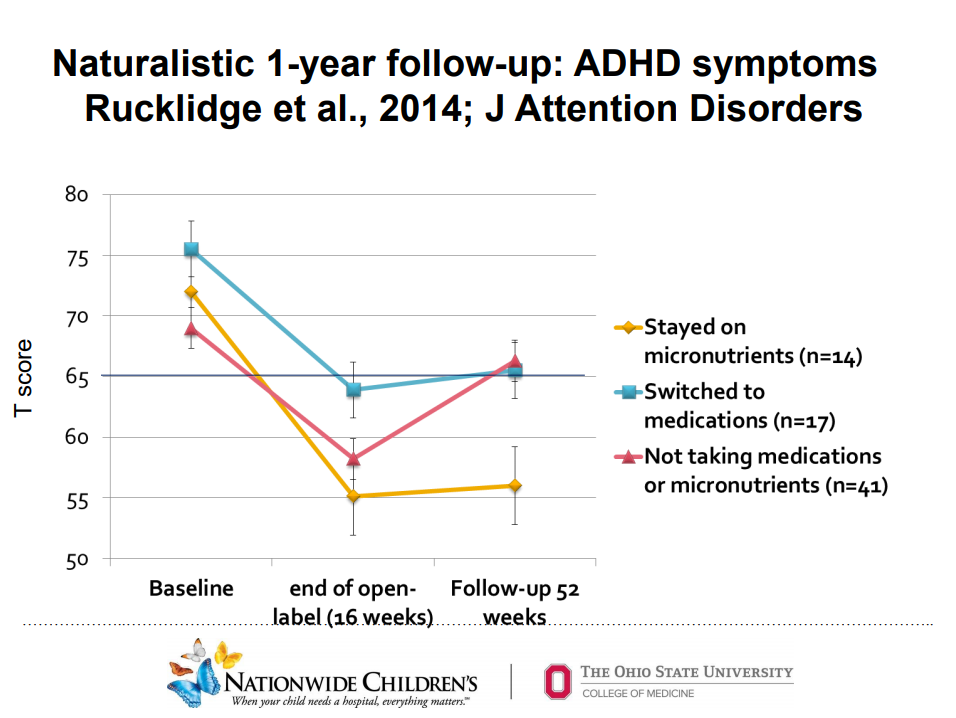
What is a micronutrient? An essential nutrient, as a trace mineral or vitamin, that is required in minute amounts, for the normal growth and development of living organisms.
How does science support the use of broad-spectrum micronutrient treatments? The brain is a micronutrient-based organ. Vitamins and minerals cross the blood-brain barrier to:
How do nutrient deficiencies affect the body's systems? Nutrient deficiencies and genetic variants in cofactors and enzymes can cause oxidative damage to nuclear DNA and mitochondria leading to:
How does the standard American diet affect micronutrient deficiency rates? Modern agricultural and food supply practices have reduced micronutrient concentrations. Naming just the top 4 deficiencies, 92% of Americans do not get enough potassium, 86% do not get enough vitamin E, 69% not enough calcium, and 57% not enough magnesium as per the IOM estimated average dietary requirements.
Nutritional Studies from Australia, Spain, UK, Japan and Canada Show:
Should micronutrient supplementation be single nutrient or broad spectrum? Single nutrient effect sizes for mental disorders are generally small. Nutrient insufficiencies, deficiencies, and nutrient-based pathway genetic variants are broad and ubiquitous across the population. Research shows broad-spectrum micronutrients are more likely to be more efficacious in more individuals than single nutrients.
What evidence supports broad-spectrum micronutrient treatments for mental disorders? Since 2001, studies supporting the safety and efficacy of broad-spectrum micronutrient treatments have been published on:
• Anxiety
• Aggression
• ADHD
• OCD
• Mood disorders/bipolar spectrum disorders
• Behavioral symptoms associated with autism
• Substance abuse
• Acute stress following natural disasters
What studies have been done on using broad-spectrum micronutrients to successfully treat ADHD? In 2014, Dr. Julia Rucklidge conducted an independent study on broad-spectrum micronutrients in adults with ADHD. The study targeted 80 adults with ADHD who were medication free, average aged 35. The study concluded that 30% of the participants experienced mild improvement after just 8 weeks compared to placebo, and and additional 38% were much improved or very much improved in hyperactivity/impulsivity as well as inattention.
What happened to those study participants after one year?
"Those who stayed on the micronutrients for one year following the study fared far better than those who reverted back to their medications or discontinued treatment altogether," shares Dr. Julia Rucklidge (2014, Br J Psychiatry). [See Figure 1]

More recently, an independent double-blind study was conducted by Dr. Julia Rucklidge, et al., on children with ADHD using Daily Essential Nutrients, an advanced, clinical strength broad-spectrum micronutrient treatment.
Their findings were published on Oct. 2, 2017, in the Journal of Child Psychology and Psychiatry.
The researchers commented, “This is the first fully blinded randomized controlled trial of medication-free children with ADHD assigned to either micronutrients or placebo…” Half of the ninety three study participants (aged from 7 – 12 years) were randomly assigned Daily Essential Nutrients and the other half were assigned placebo [micronutrient look-alike pills but with no active ingredients] for 10 weeks.” Study participants in the micronutrient group took an average of 11.8 capsules of Daily Essential Nutrients per day.
Here are the key findings from the research:
Randomized, placebo-controlled double blind studies are the gold standard of scientific rigor, and across multiple disorders and different supplement formulas, micronutrient therapy is being proving to be effective and reliable.
Useful References
• Kaplan, B. J., Rucklidge, J. J., McLeod, K., & Romijn, A. (in press). The Emerging Field of Nutritional Mental Health: Inflammation, the Microbiome, Oxidative Stress, and Mitochondrial Function. Clinical Psychological Science. DOI: 10.1177/2167702614555413
• Sarris, J. et al. (2015). Nutritional Medicine as Mainstream in Psychiatry: A Consensus Position Statement from The International Society for Nutritional Psychiatry Research (ISNPR). Lancet Psychiatry, 2, 271-274.
• Popper, C. W. (2014). Single-Micronutrient and Broad-Spectrum Micronutrient Approaches for Treating Mood Disorders in Youth and Adults. Child and Adolescent Psychiatric Clinics of North America, 23(3), 591-672. doi: 10.1016/j.chc.2014.04.001
• Rucklidge, J. J., & Kaplan, B. J. (2013). Broad-spectrum micronutrient formulas for the treatment psychiatric symptoms: A systematic review. Expert Review of Neurotherapeutics, 13(1), 49-73.]
The information presented in this article include excerpts from a presentation given by:
Barbara L. Gracious MD, Jeffrey Research Fellow, Center for Innovation in Pediatric Practice, The Research Institute at Nationwide Children’s Hospital, Associate Professor of Clinical Psychiatry and Nutrition in association with Ohio State University.